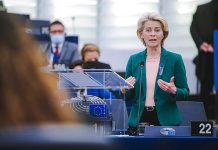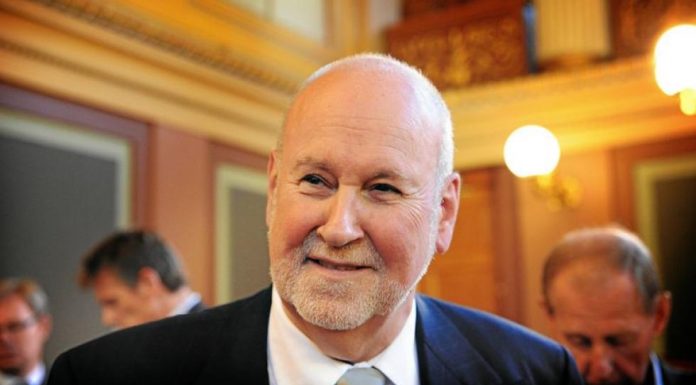The farmer protests that rocked Brussels at the start of this month have launched the issue to the very top of the EU’s political agenda. As part of a European-wide protest movement, farmers specifically targeted the 1 February summit of EU leaders, which was originally supposed to be dedicated to a new EU financial support package for Ukraine, but ended up being dominated by them.
The grievances of farmers are quite different in every single EU member state, but at the core of it is a cry to “leave us alone”, with the EU’s green policies and its “European green deal” at the very heart of their concerns.
Farmers' protests have taken Europe by storm, affecting almost every country.
Since November 2023, there have been more than 2,000 farmer-related protests across the continent. Mainly in Germany, France and Belgium. pic.twitter.com/fGa5CEVRek
— Xavi Ruiz (@xruiztru) February 12, 2024
Minor concessions
Meanwhile, moves by EU Commission President Ursula von der Leyen to ease highly contested rules on leaving land unused and to scrap a proposed pesticide regulation are unlikely to appease farmers, as much as they are indicative of a broader backlash against climate policies. The former only involves postponing the rules for one year and the latter was being contested by the European Parliament anyway, whereby von der Leyen added that her institution “could make a new proposal” about it.
Unlike the EU, the French government managed to convince farmers to stop protesting, by making some concessions. It was thereby thanked by the largest French farmer union, which in contrast however slammed the EU for its “deafness”. At the end of the day, it very much looks like mainstream parties are unwilling to fundamentally change course by dropping their green dogmas altogether. Despite the concessions by the government of French President Macron, the new leader of the Renew faction in the European Parliament, to which Macron’s party belongs, has stressed that reconsidering already passed EU green deal legislation is not an option.
Despite everything, the Renew group in the EP refuses to reconsider EU green legislationhttps://t.co/FnMQBx883k pic.twitter.com/twzpuVL91S
— Pieter Cleppe (@pietercleppe) January 28, 2024
The EU just proposed the most radical climate targets to date
That the signal of the farmers has absolutely not been received, is even clearer when looking at last week’s European Commission announcement to demand a sharpening up of climate targets, as EU Climate Commissioner Wopke Hoekstra proposed the EU’s most radical climate target ever – a 90% net emissions reduction by 2040. This despite an ailing industrial base, with industry increasingly alarmed about the high costs of green policies.
The EU thereby targets a broader phase-out of fossil fuels and rapid electrification of road transport and heating sectors. According to its own estimate, the cost of this will require investments amounting to a whopping 1.5 trillion euro every year between 2031 and 2040.
Also in the "not going well" department, all 3 stories from Bloomberg today:
– EU’s New Climate Targets Are Already Set to Face a Backlash
– EU Risks Escalating Spat With Farmers, Business Over Climate
– EU Withdraws Push to Cut Pesticide Use After Farmer Protests— Climate Disconnect (@climate_disc) February 6, 2024
Von der Leyen is the “greenest ever” EU Commission President – according to the greens
Nominally, Ursula von der Leyen may be a member of Germany’s CDU, but clearly, when it comes to it, she is firmly on the side of the greens, having clashed with her own ever more green-sceptic EPP over the last year over this. That’s also evident from what leading green MEP Philippe Lamberts said last week, when predicting that “if you want the Green Deal 2.0 to have any chance of getting off the ground it’s got to be with [von der Leyen]”, praising her as the “greenest ever” EU Commission President.
The EU Treaty requires EU leaders to “take into account” the result of the European Parliament elections – due for June 2024 – when picking a new EU Commission President. Perhaps, if the greens are indeed being hammered, as predicted by the polls, these elections should have implications for the question of whether von der Leyen deserves a second mandate.
More climate policy “business as usual”: deal on Net-Zero Industry Act
It must be noted that it’s not just the European Commission continuing with “business as usual” when it comes to climate policy. Last week, EU member states and the European Parliament struck a deal on the EU’s “Net-Zero Industry Act”, legislation setting all kinds of green targets and distorting normal market functioning with subsidies.
When the Commission proposed this last year, Belén Garijo, the ceo of German biotech and materials giant argued that such an approach simply «does not solve” Europe’s economic challenges, adding that if the EU was serious about competitiveness, it needed to “start cutting red tape . . . Enabling competitiveness requires a fundamental shift in policy to attract and retain highly innovative industries.”
🍃 Deal!@EUCouncil & @europarl just reached a provisional agreement on the Net-Zero Industry Act (#NZIA).
🌍 The regulation aims at boosting the deployment of net-zero technologies in industry, needed to reach the 🇪🇺 EU’s climate goals. pic.twitter.com/32odxTazmf
— Belgian Presidency of the Council of the EU 2024 (@EU2024BE) February 6, 2024
Industry anger against green policies
German industry has only become more vocally opposed to the current economic policy course. Last week, Siegfried Russwurm, president of Bundesverband der Deutschen Industrie (BDI), the leading industry body in Germany, issued a major warning, saying that Germany’s energy policies of boosting renewables while phasing out nuclear and coal have brought uncertainty about energy supply in the medium to long term, creating an “absolutely toxic” environment for industry investments, noting that “Nobody can say with any certainty today what our energy supply will look like in seven years’ time, and that’s why no one can say how high energy prices will be in Germany then. (…) For companies that have to make investment decisions, that is absolutely toxic.”
Meanwhile, bad economic data keep on coming from Germany, where the risk of deindustrialization now really seems to be materializing.
Chan. Olaf Scholz's INCOMPETENCE & GREEN MADNESS have hollowed out Germany’s industry.
Siegfried Russwurm, head of @Der_BDI, has taken the gloves off and correctly slammed German energy policies as “absolutely toxic.”https://t.co/yllXaR4aha
— Steve Hanke (@steve_hanke) February 8, 2024
Furthermore, also the Belgian industry federation, VBO-FEB, issued scathing criticism of the EU’s green overregulation, with the ceo, Pieter Timmermans stating that the EU’s “Green Deal does not serve as a growth engine”, thereby also complaining about the EU’s watering down of state aid rules, supposed to serve green investment in response to similar measures in the United States:
“France and Germany, together accounting for almost three-quarters of all state aid in the EU, were keen to see it happen. However, EU state aid rules were created to protect small member states against large ones. Relaxing state aid rules has been detrimental to Belgium.
(…) Meanwhile, European competitiveness is waning compared to America. In 2008, the EU had a higher gross domestic product (GDP) than the US: $16.29 trillion versus $14.77 trillion. Fourteen years later, in 2022, EU GDP has stagnated at $16.75 trillion while US GDP has skyrocketed to an impressive $25.44 trillion.”
A new manifesto from the employer federation dedicated to EU policy specifically also laments the cost of EU regulation, stating how “Environmental, social and governance (ESG) reporting obligations were rolled out very quickly in recent years and are particularly far-reaching. The implementation of all these rules will require particularly great efforts. The EU needs to give companies room to comply, without constantly imposing additional comply with them, without constantly creating additional obligations.”
EU regulation is out of control. My talk at a recent European Parliament hearing, hosted by @ecrgroup @Rob_Roos @MargaPisa (from 50'30 on):#EUregulation #betterregulation #EuropeanUnion @Europarl_EN pic.twitter.com/BbJ0HRPYWa
— Pieter Cleppe (@pietercleppe) February 12, 2024
Impact on EU trade policy
The EU’s green regulatory avalanche is meanwhile also impacting the EU’s trade policy. In particular the Mercosur deal looks unlikely to be passed now in its current form, as French President Macron has told the EU to end attempts to pass it – something which the EU Commission still opposes.
This is mostly the result of pressure by farmers. Some farmers genuinely oppose all new trade deals, but for most of them, the concern is mostly that they are being burdened by all kinds of new regulations – for example pesticides restrictions – while imports from Ukraine or Latin America are not being subjected to the same kind of bureaucracy. Clearly, freeing the European farming sector from EU central planning would greatly increase support for trade deals among farmers in the EU, as many of them also benefit from exports.
Meanwhile, the United Kingdom, which has obtained the freedom to conduct its own trade policy after Brexit, offers an alternative approach. Last year, it succeeded in getting access to the Trans-Pacific Trade Agreement CPTPP, which counts as the biggest trade deal for the UK after Brexit.
A key reason for this was that it decided to recognize the approach of its trading partners to combat deforestation as equivalent, unlike the EU, which is attempting to impose its own model upon trading partners. While the EU’s approach caused a major rift and even a freezing of trade talks with palm oil exporting countries like Malaysia and Indonesia, who are strongly affected by the EU’s new deforestation rules, the UK’s approach was key to help it to get access to this new CPTPP trade arrangement, which involves countries generating 15 percent of global GDP.
The UK Trade and Agriculture Commission (TAC) has now also officially confirmed that in particular Malaysia’s standards to prevent deforestation – called the MSPO – are acceptable, stating: “It is expected that most Malaysian palm oil production will be certified against the MSPO standard by 1 January 2025, which is around the time that the Government anticipates the UK will accede to CPTPP”, adding that ““The risk that CPTPP would lead to an increase in imports of palm oil from deforested land has been determined to be low.”
This should come as no surprise, given how NGOs like Global Forest Watch have lauded Malaysia’s success in reducing deforestation. Also on other policy areas, however, the EU is increasingly trying to impose its specific policy choices and conditions on trading partners. This leads to tensions, as for example with the new “due diligence” directive, which imposes on importing companies to investigate not only whether human rights violations are committed by their suppliers, but also whether all kinds of specific ecological standards are respected. A German industry federation strongly criticised this approach by the EU, warning that “With this, the EU is putting the next nail in the coffin of European industry’s competitiveness.”
"With today’s agreement […] the EU is putting the next nail in the coffin for the international competitiveness of European industry,” – Thilo Brodtmann, managing director of Germany’s Mechanical Engineering Industry Association (VDMA) https://t.co/6thmNaIXzQ pic.twitter.com/MdropyUF1k
— Pieter Cleppe (@pietercleppe) December 15, 2023
Perhaps it is slowly dawning on policy makers that the wrong path has been chosen. In May 2023, German Chancellor Scholz urged for refraining from “colonialism” when pursuing trade deals, which he thought should be sped up. This following complaints by African countries in particular that the EU was engaging in “neo-colonialism and regulatory imperialism” by linking greater openness to trade with demands on workers’ rights, food safety, and climate policy. Some of Europe’s African trade partners thereby even threatened to look to China instead. Scholz argued that “if we continue to negotiate new free trade agreements for years without success, others will dictate the rules in the future—with lower environmental and social standards.”
A different model
It is one thing to aim to tackle climate change. It is quite another to try to do that through central planning and detailed bureaucratic micro-management, which the EU very much has been doing, with deindustrialisation and angry farmers as the result.
A different approach is however available. The “Climate & Freedom International Coalition“, a group of academics and policymakers, worked out an alternative to current central planning policies and the collectivist “Paris Agreement”, which the EU is very keen on. In doing so, the group worked out a proposed international treaty, based on the premise of relying on free markets to come up with carbon-neutral solutions.
In sum, this alternative model comes down to simply ending large-scale government intervention in the energy sector and thereby also abolishing all conventional energy subsidies. The idea is to encourage investment in newer, cleaner technologies.
States that ratify this treaty would then enjoy trade benefits, provided they adopt climate-friendly free-market policies. Suggestions for this include encouraging targeted tax cuts (“Clean Tax Cuts”), specifically in the four sectors that account for 80% of greenhouse gas emissions – transport, energy and electricity, industry and real estate. The idea is that because tax free interest is estimated to reduce the cost of debt by some 30% or more, this serves to drive investment in newer, cleaner technologies, while unlocking capital flows across borders. Furthermore, signatories would also be stimulated to introduce tax cuts aimed at demonopolisation. The latter means scrapping profit taxes for investors that purchase companies with a monopoly and state-owned enterprises, all with the aim of encouraging energy market liberalisation among treaty parties.
Furthermore, there is the suggestion of encouraging entrepreneurs and financiers in the states that signed the treaty through tax-exempt “CoVictory bonds” to make investments in “Property, plant, and equipment (PP&E)” – assets that are important to companies in the long term. The aim is to thereby lower the cost of borrowing by at least 30%, to incentivise more innovation.
So far, the EU is however still strongly embracing the current approach, linked to the Paris Treaty. At the November UN climate conference COP28 in Dubai, EU policy makers from both the Commission and the European Parliament warmly embraced the COP28 deal, with EU Commission chief Ursula von der Leyen lauding it as “the beginning of the post-fossil era” with German MEP Peter Liese, the head of the European Parliament delegation at COP28 calling it “really historic”, while adding that the deal was not radical enough, as he regretted that the final text does not mention a “phase-out” of fossil fuels like the EU had been calling for. This long serving MEP is from Germany’s CDU and he has just managed to obtain a good position on the list to be re-elected in June, indicating that the party has anything but abandoned green dogma, despite some critical talk now and then to appease the base.
German industrial output falls to 2006 levels.
18 lost years, courtesy of environmentalists 🫡 https://t.co/eldeh1iYMf
— Peter St Onge, Ph.D. (@profstonge) February 12, 2024
Conclusion
Despite changing rhetoric and a few minor policy shifts, the EU’s climate train simply continues to roll on. Looking at opinion polling, it becomes clear that if there is going to be any real change in Brussels soon, it will need to come from the European Parliament elections in June. Looking at how entrenched green dogmas are however, any wake-up call would need to be really loud.













